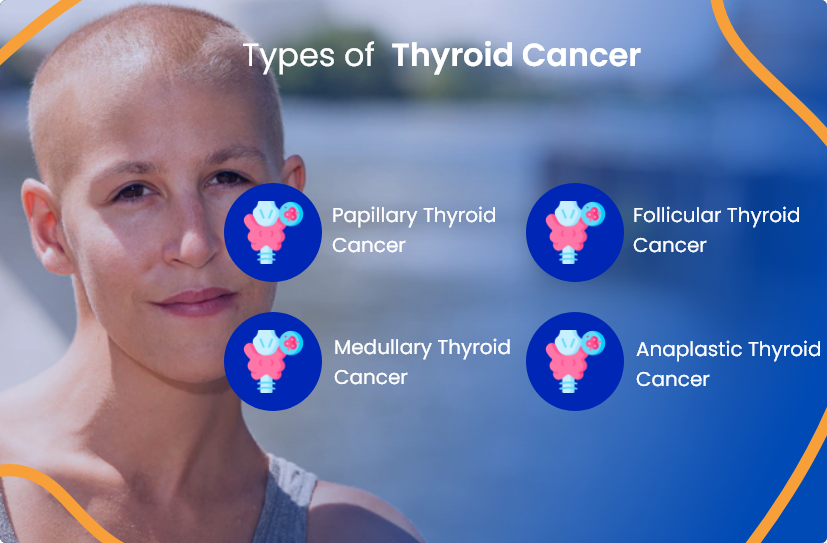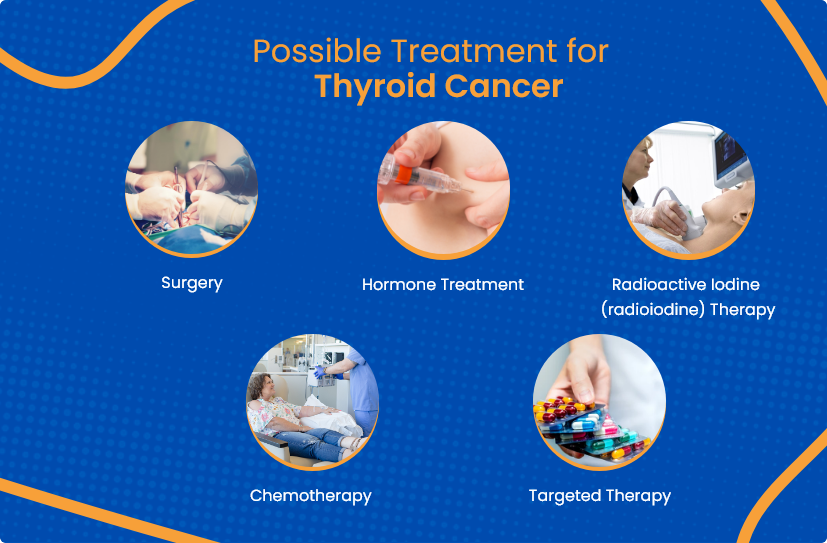
Book a Consultation
Thank you!
Your form has been sent successfully.

Thyroid cancer starts in your thyroid gland, which is located in the lower front part of your neck. It develops when healthy cells in the thyroid change (mutate) and grow into a tumor.
If left untreated, these cancerous cells can spread (metastasize) to other parts of your body. There’s more than one type of thyroid cancer, each with its own behavior and treatment options. Thankfully, thyroid cancer is usually very treatable if it's found early.
Doctors classify thyroid cancer into four main types. Each one behaves differently in terms of how quickly it grows and spreads.

Papillary thyroid cancer is the most common type. It grows slowly and often spreads to lymph nodes (small glands in your neck).
Fortunately, this cancer usually responds very well to treatment, making it highly manageable for most people.
Follicular thyroid cancer is less common, accounting for about 10% to 15% of thyroid cancers. It tends to spread differently, often traveling through blood vessels to reach bones or lungs. Early detection helps manage this type more effectively.
Medullary thyroid cancer arises from special cells called C-cells in your thyroid gland. These cells produce calcitonin, a hormone doctors can detect with a blood test, helping in diagnosis and monitoring.
Some medullary thyroid cancers are linked to genetic changes passed down through families.
Anaplastic thyroid cancer is rare, making up less than 2% of thyroid cancers. It usually appears in adults over the age of 60.
Unlike other types, anaplastic thyroid cancer grows quickly and spreads aggressively, requiring prompt attention.
Thyroid cancer often has no symptoms at first. When symptoms do appear, they might include:
If your doctor suspects thyroid cancer, several tests can help confirm the diagnosis and guide treatment choices. Your exact tests depend on your situation, including your age, gender, and overall health.
Your doctor might perform:
Not every patient requires all of these tests. Your doctor will recommend tests based on your personal needs and situation.
Your thyroid cancer treatment will depend on factors such as cancer type, its stage, your overall health, possible side effects, and your personal preferences.
Many people require more than one type of treatment to manage their thyroid cancer effectively. Cancer stage (how far it has spread) also significantly influences which treatment options your doctor recommends.

Surgery for thyroid cancer, also called resection, involves removing the tumor along with a small rim of healthy tissue around it, known as a margin. Surgery options depend on tumor size and location:
After surgery, most people require thyroid hormone therapy with a medication called levothyroxine. You’ll take this medication daily at the same time each day to replace your body's natural thyroid hormones.
This treatment can also help prevent any remaining cancer cells from growing by lowering certain hormone signals in your body.
Your thyroid naturally absorbs iodine, which makes radioactive iodine therapy effective for thyroid cancer. This treatment involves swallowing a radioactive form of iodine (I-131) that your thyroid cells absorb.
Radioactive iodine then destroys any remaining cancerous thyroid cells or cells that have spread beyond your thyroid gland. This therapy is most often used for papillary and follicular thyroid cancers.
Chemotherapy uses medications to kill cancer cells or stop them from dividing and growing. Chemotherapy treatments are given in cycles, with rest periods in between.
Depending on your condition, you may receive a single chemotherapy drug or a combination of medications designed to work together.
Targeted Therapy uses specialized drugs that specifically block certain proteins or genetic changes responsible for cancer growth. This approach aims to limit damage to healthy cells and reduce side effects. Targeted therapies can help control cancer growth and spread by focusing on cancer cells' unique characteristics.
At ACTC, our Florida-based cancer experts create individualized care plans grounded in the latest oncology research and national treatment guidelines. We take time to explain your options clearly and coordinate each phase of care.
Our goal is to provide a reassuring, patient-centered environment where your medical, emotional, and logistical needs are all supported—every step of the way.
The following are our providers whom you can consult at ACTC:

MD, Hematology & Oncology

MD, Ph.D., Hematology/ Medical Oncology

MD, Radiation Oncologist
At ACTC in Florida, our cancer specialists are backed up by qualified clinical staff with over two decades of experience. We guide you through diagnosis, staging, treatment, and long-term follow-up in one convenient location.
Call 352-345-4565 or book an appointment.

Finding a care team you can trust and believe in is not just essential, but it's more important than ever in these uncertain times. The world of cancer treatment continues to evolve, with new breakthroughs and discoveries constantly altering the course of treatment. It's vital to figure out which treatment combination is best for you. It's also possible to become overwhelmed. That's why it's critical to seek out qualified and experienced cancer specialists. Our integrated, comprehensive cancer care is delivered by a team of specialists and other cancer experts, all under one roof, and includes everything from cutting-edge cancer treatments to supportive therapies that manage side effects.
Schedule a consultation by calling
 352-345-4565
352-345-4565
In the early stages, thyroid cancer usually doesn’t cause noticeable symptoms. As it progresses, common signs may include a lump in your neck, difficulty swallowing, hoarseness, or swollen lymph nodes in the neck
The exact cause of most thyroid cancers isn't clear, but certain genetic conditions and exposure to high radiation levels can increase risk. However, many people diagnosed have no known risk factors.
Thyroid cancer has an excellent prognosis when detected and treated early. Most cases respond well to treatment, especially the common types, like papillary and follicular thyroid cancers. Discuss your personal outlook with your doctor.
Schedule a consultation by calling
 352-345-4565
352-345-4565